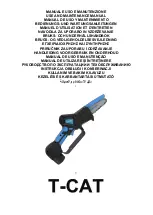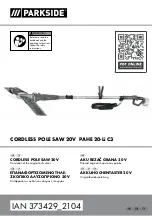
GB
21
Switch on the saw.
Push the cross stop (14) and the workpiece
toward the blade in order to make the cut.
Important:
Always hold the guided part of the
workpiece. Never hold the part which is to be
cut off.
Push the cross stop (14) forward until the
workpiece is cut all the way through.
Switch off the saw again. Do not remove the
offcut until the blade has stopped rotating.
9.1.6 Operating the laser (Fig. 26-28)
The laser light is generated by a laser diode powered
by two batteries. The laser light is enlarged to form a
line and is emitted through the laser emission
aperture. You can then use the line as an optical
marker for the sawing line for precision cuts. Follow
the laser safety instructions.
To switch on:
Move the ON/OFF switch for the laser
(46) to the “I” position. A laser line is projected onto
the material you wish to process, providing an exact
guide for the cut.
To switch off:
Move the ON/OFF switch for the laser
(46) to the “0” position.
Replacing the battery:
Ensure that laser (45) is
switched off. Dismantle the saw blade guard as
described in 7.3. Remove the battery compartment
cover (47).
Take out the old batteries and insert new ones.
Check that the battery terminals are positioned
correctly. Replace the battery compartment cover.
Reinstall the saw blade guard (2) as described in 7.3.
Always switch off the laser when not in use in
order to save the batteries.
The laser beam can be blocked by deposits of
dust and chips. You should therefore remove
these particles from the laser emission aperture
before you use the laser.
Notes on batteries: If you do not intend to use the
laser for a lengthy period of time, remove the
batteries from the battery compartment. Any
leakage of battery fluid might damage the tool.
Do not place the batteries on heaters or expose
them to direct sunshine for long periods;
temperatures in excess of 50°C may damage the
tool.
10. Maintenance
Important!
Pull out the power plug first.
Remove dust and dirt regularly from the
machine. Cleaning is best carried out with a fine
brush or a cloth.
Never use caustic agents to clean plastic parts.
11. Ordering replacement parts
Please provide the following information on all orders
for replacement parts:
Model/type of device
Article number of the device
ID number of device
Number of the required replacement part
For our latest prices and information please go to
www.isc-gmbh.info
12. Disposal and recycling
The unit is supplied in packaging to prevent its being
damaged in transit. This packaging is raw material
and can therefore be reused or can be returned to
the raw material system.
The unit and its accessories are made of various
types of material, such as metal and plastic.
Defective components must be disposed of as
special waste. Ask your dealer or your local council.
13. Battery disposal
Batteries contain materials that are potentially
harmful to the environment. Never place batteries in
your household refuse, in fire or in water. Batteries
should be collected, recycled or disposed of by
environment-friendly means. Send your old batteries
to ISC GmbH, Eschenstrasse 6 in D-94405 Landau.
You can then be sure that the equipment will be
correctly disposed of by the manufacturer.
ᪿ
᪾
쾷
Anleitung_NTS_1725_L_SPK7:_ 16.03.2010 11:12 Uhr Seite 21
Summary of Contents for 43.406.49
Page 6: ...6 18 16 17 20 21 19 43 40 42 41 36 27 Anleitung_NTS_1725_L_SPK7 _ 16 03 2010 11 12 Uhr Seite 6...
Page 7: ...7 22 23 24 26 25 46 I 0 3 27 45 2 5 Anleitung_NTS_1725_L_SPK7 _ 16 03 2010 11 12 Uhr Seite 7...
Page 8: ...8 28 5 15 15 47 45 2 40 48 29 Anleitung_NTS_1725_L_SPK7 _ 16 03 2010 11 12 Uhr Seite 8...
Page 42: ...42 Anleitung_NTS_1725_L_SPK7 _ 16 03 2010 11 13 Uhr Seite 42...
Page 43: ...43 Anleitung_NTS_1725_L_SPK7 _ 16 03 2010 11 13 Uhr Seite 43...
















































